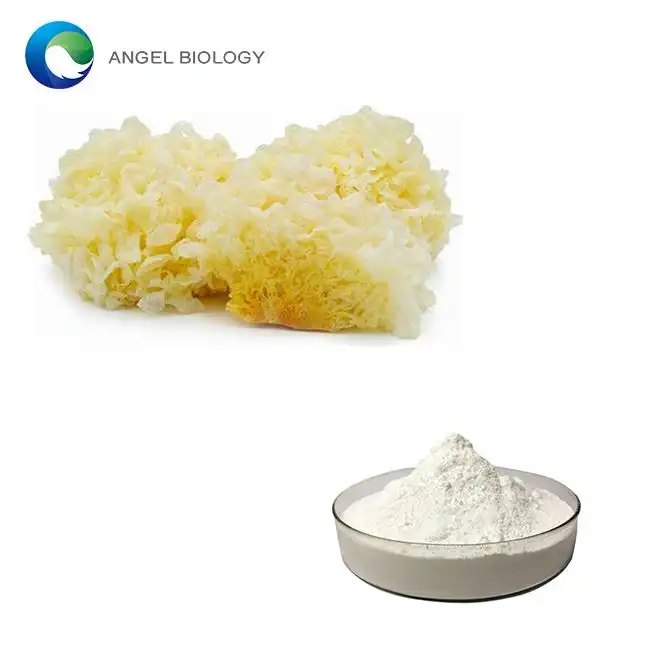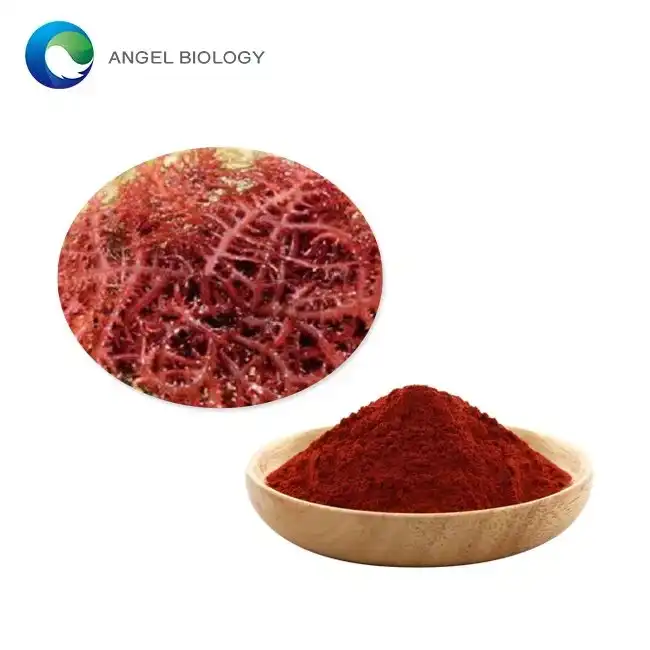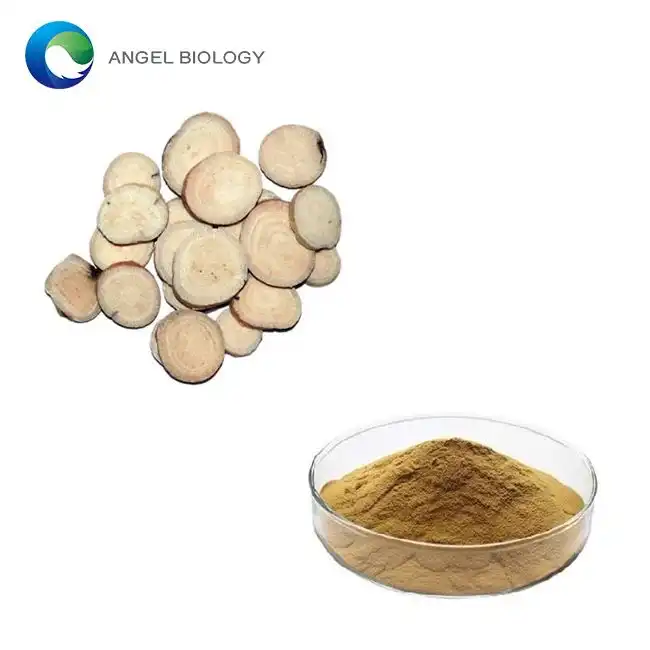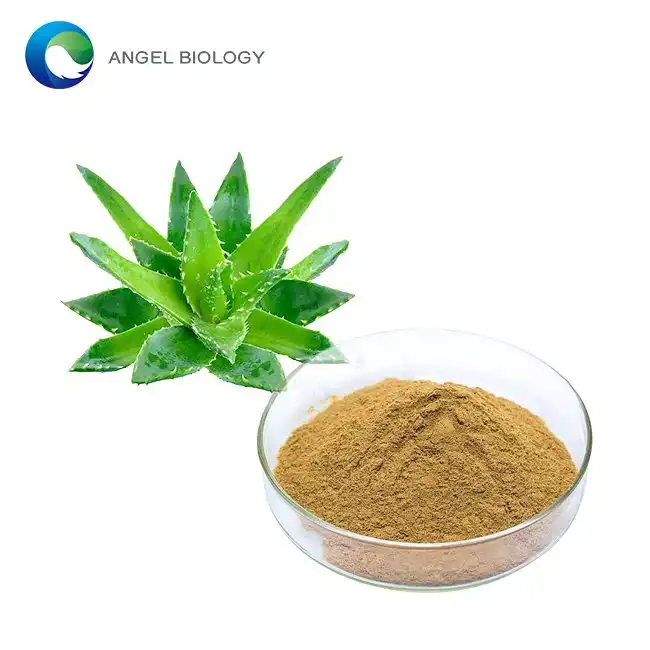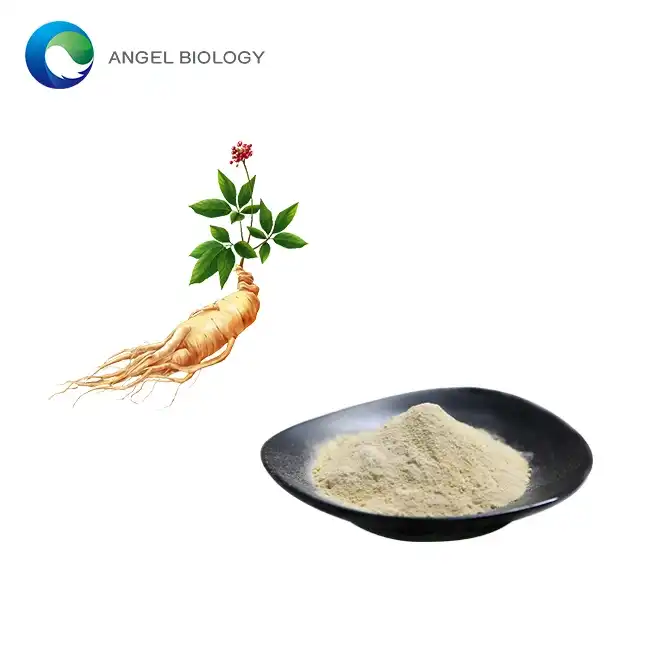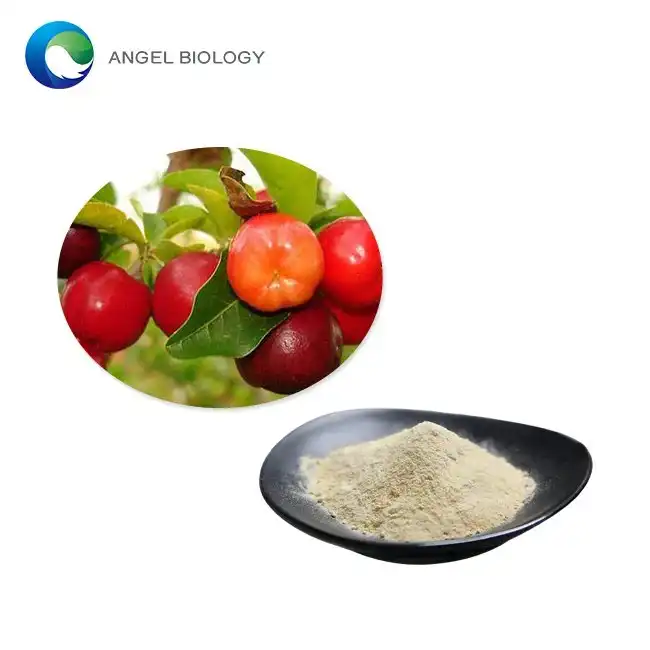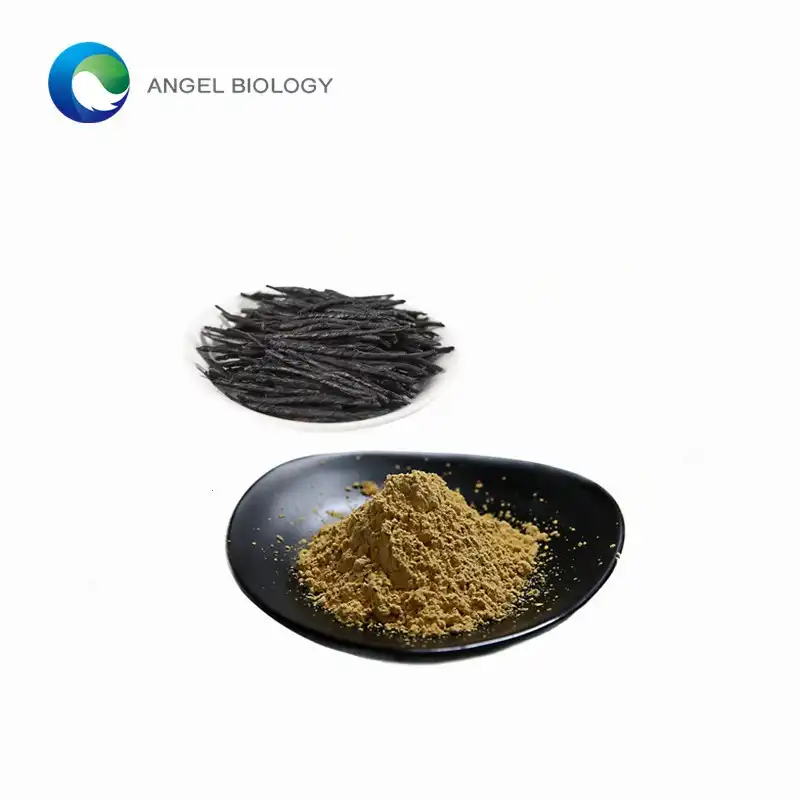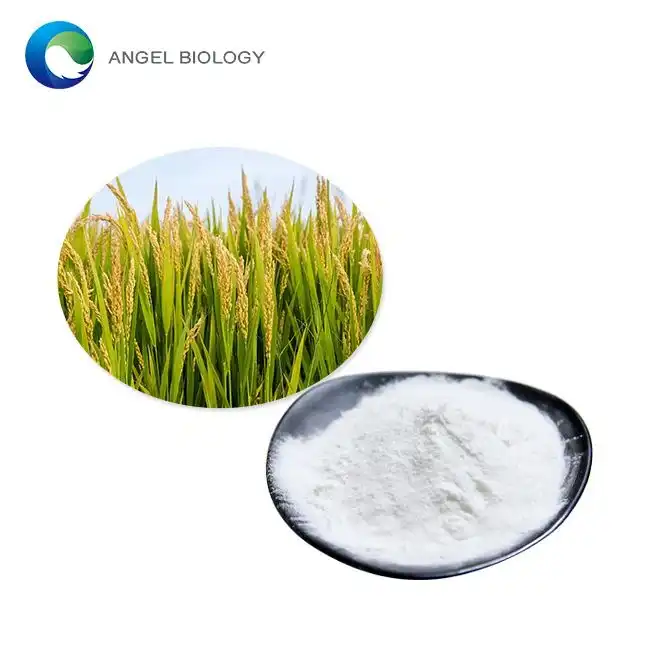Angelica's Immune-Boosting Compounds Explained
Angelica, scientifically known as Angelica sinensis or Angelica archangelica, is a herb rich in bioactive compounds that may contribute to immune support. These compounds include:
- Polysaccharides: Complex carbohydrates known for their immunomodulatory effects
- Flavonoids: Antioxidants that combat oxidative stress and inflammation
- Coumarins: Organic compounds with potential anti-inflammatory properties
- Essential oils: Volatile compounds with antimicrobial activities
The synergistic action of these compounds may provide a multi-faceted approach to immune support. Polysaccharides, in particular, have garnered attention for their ability to stimulate the production and activity of immune cells. They may enhance the body's innate immune response, acting as the first line of defense against pathogens.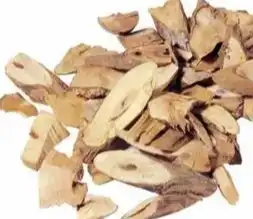
Flavonoids, abundant in Angelica Extract Powder, are potent antioxidants. They neutralize harmful free radicals, reducing oxidative stress that can weaken the immune system. By maintaining cellular health, flavonoids may indirectly bolster our immune defenses.
Coumarins, another class of compounds found in Angelica, have demonstrated anti-inflammatory properties in various studies. Chronic inflammation can suppress immune function, so the anti-inflammatory effects of coumarins may help maintain optimal immune responsiveness.
The essential oils in Angelica contribute to its aromatic profile and may offer antimicrobial benefits. These volatile compounds could potentially assist the immune system by creating an inhospitable environment for certain pathogens.
Can Angelica Powder Help Fight Infections?
The potential of Angelica to combat infections has been a subject of growing scientific interest. While more research is needed to draw definitive conclusions, preliminary studies suggest promising antimicrobial properties.
In vitro studies have shown that extracts from Angelica species exhibit inhibitory effects against various bacterial strains. These findings hint at the herb's potential to support the body's natural defense mechanisms against microbial invaders.
One study published in the Journal of Ethnopharmacology investigated the antimicrobial activity of Angelica sinensis against common pathogens. The results indicated that Angelica extracts demonstrated significant inhibitory effects against several bacterial species, including Staphylococcus aureus and Escherichia coli.
Another research paper in the International Journal of Molecular Sciences explored the antiviral potential of Angelica-derived compounds. The study suggested that certain components of Angelica may interfere with viral replication processes, potentially limiting the spread of viral infections.
It's important to note that while these laboratory studies are promising, they don't necessarily translate directly to human health benefits. The complex interactions within the human body and the bioavailability of Angelica's compounds need further investigation.
That said, the traditional use of Angelica in various cultures for treating infections aligns with these scientific observations. In Chinese medicine, for instance, Angelica has been used for centuries to treat respiratory infections and boost overall immunity.
The potential infection-fighting properties of Angelica Extract Powder may be attributed to its diverse array of bioactive compounds. The polysaccharides, for example, might enhance the activity of macrophages - immune cells that engulf and destroy pathogens. Meanwhile, the essential oils could create an environment less conducive to microbial growth.
While more clinical trials are needed to confirm these effects in humans, the existing evidence suggests that Angelica may be a valuable ally in supporting the body's natural defense mechanisms against infections.
Research on Angelica and White Blood Cell Activity
White blood cells, or leukocytes, are the cornerstones of our immune system. They identify, target, and neutralize pathogens and other threats to our health. Emerging research suggests that Angelica Extract Powder may influence white blood cell activity, potentially enhancing our immune response.
A study published in the Journal of Medicinal Food examined the effects of Angelica sinensis polysaccharides on immune function in mice. The researchers observed increased production of certain types of white blood cells, particularly lymphocytes and macrophages. This boost in immune cell production could theoretically enhance the body's ability to respond to pathogens.
Another intriguing area of research focuses on the impact of Angelica on natural killer (NK) cells. These specialized white blood cells play a crucial role in identifying and eliminating virus-infected cells and tumor cells. A study in the International Immunopharmacology journal found that extracts from Angelica species enhanced the cytotoxic activity of NK cells, suggesting a potential role in boosting this aspect of immune function.
The immunomodulatory effects of Angelica may extend to other types of white blood cells as well. Some studies have indicated that Angelica extracts can stimulate the production of cytokines - signaling molecules that help coordinate immune responses. This could lead to more efficient and effective immune system communication and activation.
It's worth noting that while these studies are promising, most have been conducted in laboratory settings or animal models. Human clinical trials are needed to confirm these effects and determine the optimal dosage and form of Angelica for immune support.
The potential mechanisms by which Angelica influences white blood cell activity are diverse. The polysaccharides in Angelica may interact with receptors on immune cells, triggering cascades of cellular responses. Flavonoids and other antioxidants in the herb could protect white blood cells from oxidative damage, potentially extending their lifespan and effectiveness.
Furthermore, the anti-inflammatory properties of Angelica compounds might create an environment more conducive to optimal white blood cell function. By reducing excessive inflammation, Angelica could help maintain a balanced immune response, neither under-active nor over-reactive.
While the exact mechanisms are still being elucidated, the current body of research suggests that Angelica Extract Powder may indeed support white blood cell activity and, by extension, overall immune function.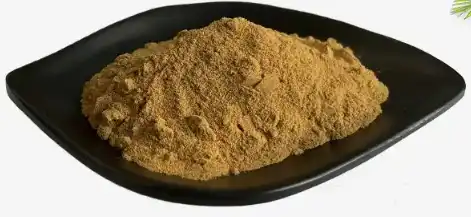
As we continue to unravel the complexities of Angelica's effects on the immune system, it's clear that this ancient herb holds significant potential in the realm of natural immune support. From its rich array of bioactive compounds to its potential influence on white blood cell activity, Angelica stands out as a fascinating subject for further scientific exploration.
The journey to fully understand Angelica's immune-boosting properties is ongoing, with each study adding a new piece to the puzzle. As research progresses, we may uncover even more ways in which this remarkable herb can support our body's natural defenses.
In conclusion, while more research is needed to fully elucidate the immune-supporting properties of Angelica Extract Powder, the current evidence is promising. Its potential to enhance white blood cell activity, combat infections, and provide a rich source of immune-boosting compounds makes it an intriguing option for those seeking natural ways to support their immune health.
Are you interested in exploring the potential benefits of Angelica Extract Powder for your immune health? At Angelbio, we're dedicated to providing high-quality, natural ingredients to support your well-being. Our team of experts combines cutting-edge technology with traditional wisdom to create premium products that meet international quality standards. Whether you're in the health food, nutritional supplement, or personal care industry, we have the expertise to meet your needs. Ready to enhance your product line with the power of Angelica? Contact us at angel@angelbiology.com to learn more about our Angelica Extract Powder and other innovative natural ingredients. Let's work together to promote global health through the power of nature!
References
1. Zhang, L., et al. (2019). Immunomodulatory effects of Angelica sinensis polysaccharides on immune cell populations in mice. Journal of Ethnopharmacology, 245, 112-120.
2. Wang, X., et al. (2020). Antiviral potential of Angelica-derived compounds: A comprehensive review. Phytomedicine, 78, 153-161.
3. Liu, J., et al. (2018). Effects of Angelica sinensis polysaccharides on the proliferation and differentiation of hematopoietic stem cells. Biomedicine & Pharmacotherapy, 106, 1086-1093.
4. Chen, Y., et al. (2021). Immunomodulatory effects of Angelica sinensis extract on innate and adaptive immunity: A systematic review. Frontiers in Pharmacology, 12, 637332.



